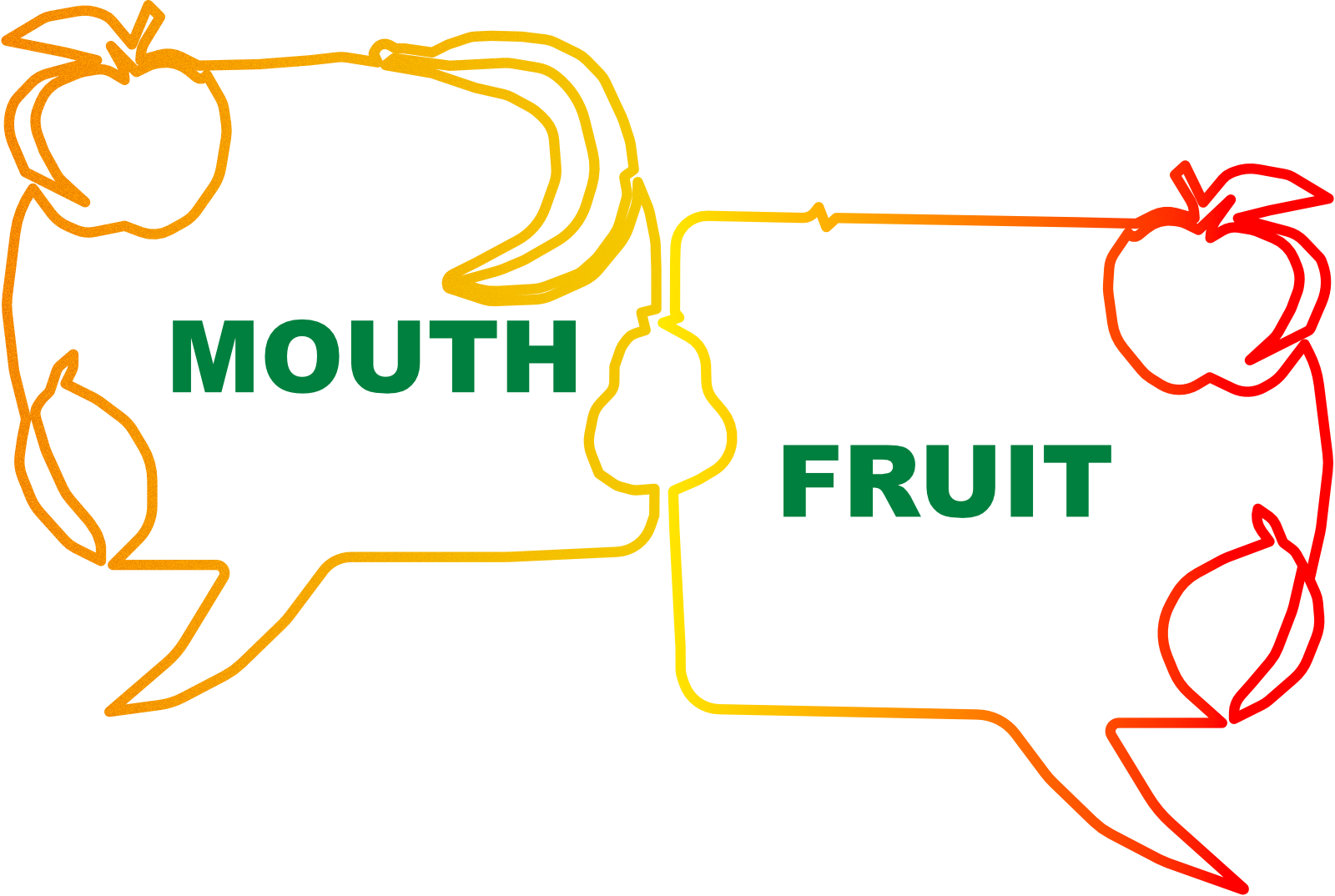Why seek fruitful dialogue?

What is Fruitful Dialogue?
It is bountiful banter, dendritic discussion, pleasant parley. See more about fruitful dialogue in this early Mouth Fruit post.
Why Would You Want Fruitful Dialogue?
You've stumbled onto Mouth Fruit. Maybe a friend sent you a link. Maybe you searched for something about civil discourse and landed here. You're reading this, so something pulled you in. But maybe some thing is making you hesitate.
Why would I want to do this? What's in it for me?
Good question. Let's explore some possible answers—yours might be among them, or you might discover new ones you hadn't considered.

Goals
Ready for some candidate goals to consider? Let's jump in.
🔲 Goal: "I Want to Get Along Better With My Family"
Family conversations keep hitting landmines. Politics, religion, life choices, ethics are now dangerous topics. You want to stay connected without pretending to agree about everything. But, how?
Especially at Thanksgiving. We know that know that gathering is coming for many persons. Perhaps you. You can already feel the dread. Fruitful dialogue won't make Uncle Bob suddenly agreeable, but it might give you a way to navigate the minefield without everything exploding.
🔲 Goal: "I'm Curious About the Person Who Rages at Me"
Maybe someone directs real anger your way—about your views, your choices, your existence in some space. It's not pleasant. But underneath your defensiveness, there's a spark of curiosity: What's really going on with them? What do they actually think?
Fruitful dialogue creates space to explore that curiosity. Not to excuse the rage or absorb abuse, but to understand the thinking behind it. Sometimes understanding doesn't lead to agreement—it just leads to understanding. That can be valuable on its own.
🔲 Goal: "I'm Curious About the Person I Rage At"
Maybe you're the one who feels the anger. Someone's views infuriate you. Their choices seem incomprehensible or harmful. But if you're honest, there's also a question underneath: How did they get there? What do they actually believe and why?
Fruitful dialogue lets you explore that question without abandoning your convictions. You can be passionate about something and still curious about the person. The dialogue might not dissolve your anger, but it might clarify what you're actually angry about.
🔲 Goal: "I Want to Share and Receive Ideas"
Maybe you're not in conflict with anyone in particular. You simply enjoy the mutual sharing of ideas—the collaborative back-and-forth where thoughts build on each other. You want conversations where both people are contributing and both people are learning.
Fruitful dialogue is that exchange at its best. It removes the focus on debate (where you defend positions) or small talk (where nothing substantial happens). It's the genuine flow of ideas between people engaged in exploration together.
Yes. This can happen when opposing convictions come together.
🔲 Goal: "I'm Open to Being Wrong"
Maybe you hold views but you're intellectually honest enough to admit they might need refinement—or might even be wrong. You're open to learning. You're open to changing your position if you encounter something more true.
This takes courage. Fruitful dialogue rewards that courage by creating space where changing your mind isn't weakness—it's growth. Where "I hadn't considered that" or "You've convinced me" are signs of strength, not surrender.
🔲 Goal: "I'm Seeking Truth"
Maybe you have a deeper drive: you want to understand what's actually true, not just what's comfortable or tribal or expedient. You believe truth exists (or even Truth with a capital T), and you think dialogue with others is part of how we approach it.
Fruitful dialogue serves this goal because it challenges our blind spots and biases. We each see part of reality clearly and part through distortion. Comparing notes with someone who sees differently helps us get closer to what's actually there.
🔲 Goal: "I Want Someone to Change"
Maybe you're not just curious—you have a specific hope. You want someone to change their behavior or beliefs. Maybe it's important. Maybe it's even urgent.
Fruitful dialogue doesn't guarantee you'll convince anyone, but it creates better conditions for change than argument or coercion. People are more likely to reconsider their position when they feel heard and understood than when they feel attacked. This is especially true in emergencies, where persuasion needs to happen quickly but carefully.
🔲 Goal: "I Need to Navigate a Power Dynamic"
Maybe you need to get along with a teacher, a boss, a parent, or someone else who has authority over you. You disagree with them about something, but open conflict would cost you. You need a way to engage that preserves the relationship and your position.
Fruitful dialogue gives you tools for this tricky situation. It's not about manipulation or fake agreement—it's about finding ways to genuinely communicate across a power imbalance. Understanding their perspective might help you navigate the dynamic more skillfully.
🔲 Goal: "I Need to Make Something Happen"
Maybe you need to explore the possibility of trade with someone, make an agreement, coordinate on a project, or accomplish something together. You don't have the luxury of avoiding people you disagree with—you actually need to work with them.
Fruitful dialogue is intensely practical here. It's about finding enough common ground to get things done. You're not trying to convert anyone to your worldview—you're trying to build a bridge sturdy enough to support whatever you need to accomplish together.
🔲 "I'm Exhausted by the Alternatives"
Maybe you're tired of the constant dunking, the performative outrage, the endless cycles of argument that go nowhere. You don't want to withdraw entirely from difficult conversations, but the current mode is draining you.
Fruitful dialogue offers a different way. It's not pollyanna or naive—it's just choosing to engage in a way that leaves you energized rather than depleted. Even hard conversations can be fruitful if they're collaborative rather than combative.
🔲 "I Want to Contribute to a Culture of Fruitful Dialogue"
Maybe you have a meta-goal: you believe the world needs more examples of people talking across differences well. You're not naive about solving everything through conversation, but you think your example matters—for your kids, your community, your corner of the internet.
This is the ripple effect goal. Your direct conversations have their own value, but they also create externalities—others see what's possible and feel emboldened to try. You're not just having fruitful dialogue; you're helping build a culture where it's more common.
Different Goals Can Coexist
Here's something worth noticing: the person you're talking with might have completely different goals than you. You might be curious about their rage while they're trying to convince you to change. They might be seeking truth while you're just trying to get through Thanksgiving. One of you might want to explore trade possibilities while the other is testing their thinking.

That's okay. Fruitful dialogue can serve multiple purposes simultaneously. The collaborative nature of it—the back-and-forth working together—means it can be fruitful in different ways for different participants.
Have multiple goals when entering dialog? Go for it!
What is this fruitful dialogue you speak of?
Good question. I think we will develop a feel for that as we learn together. A start of an answer is in the Mouth Fruit post What is Fruitful Dialogue?
You might be thinking, didn't you point to that post earlier? Well, yes, I did.
Your Turn
Which of the goals resonates? Maybe none of them exactly capture your motivation. Maybe you have a goal I haven't listed here.
The point isn't to prescribe the "right" reason to seek fruitful dialogue. The point is to help you clarify: What do I actually want here? Once you know that, you can pursue it with more intention.
And who knows—as you explore fruitful dialogue, you might discover new goals you didn't even know you had. You might start wanting to understand someone and end up wanting to contribute to a whole culture. You might begin just trying to survive Thanksgiving and discover you're actually seeking something true.
The door is open. Take a step.
